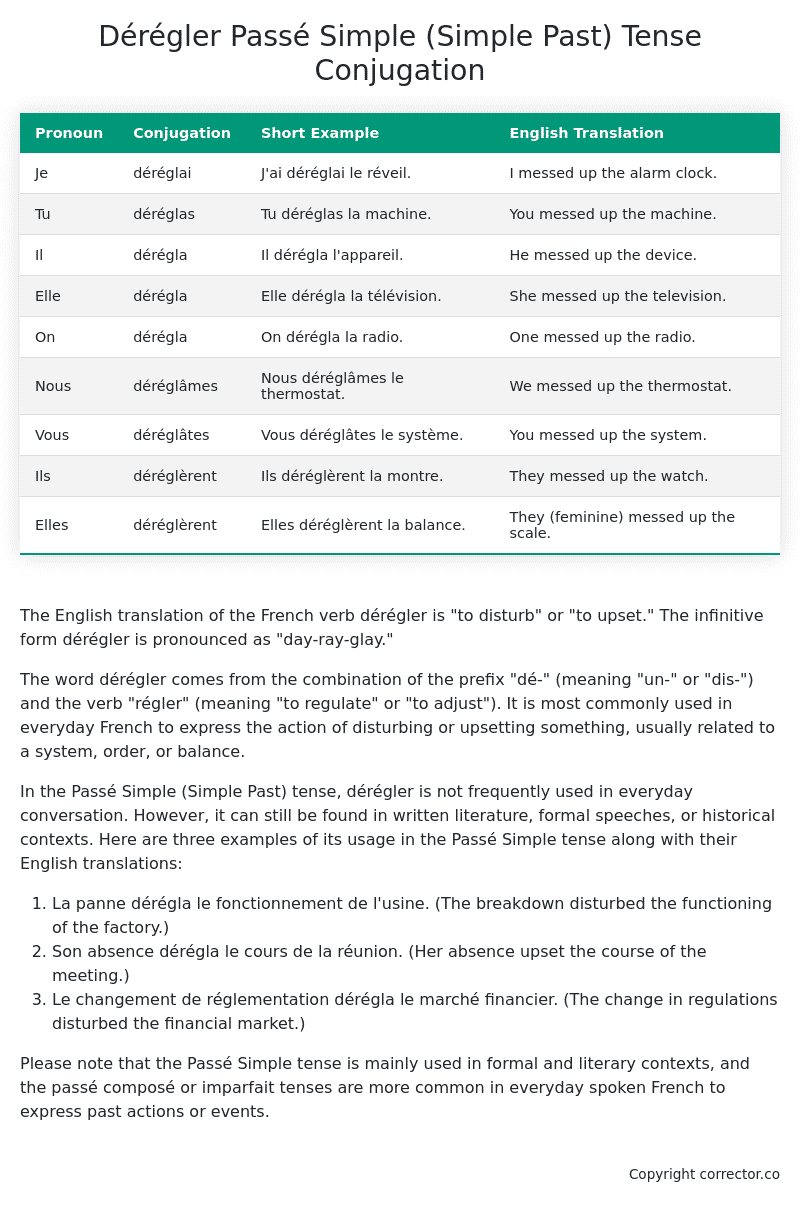Passé Simple (Simple Past) Tense Conjugation of the French Verb dérégler
Introduction to the verb dérégler
The English translation of the French verb dérégler is “to disturb” or “to upset.” The infinitive form dérégler is pronounced as “day-ray-glay.”
The word dérégler comes from the combination of the prefix “dé-” (meaning “un-” or “dis-“) and the verb “régler” (meaning “to regulate” or “to adjust”). It is most commonly used in everyday French to express the action of disturbing or upsetting something, usually related to a system, order, or balance.
In the Passé Simple (Simple Past) tense, dérégler is not frequently used in everyday conversation. However, it can still be found in written literature, formal speeches, or historical contexts. Here are three examples of its usage in the Passé Simple tense along with their English translations:
- La panne dérégla le fonctionnement de l’usine. (The breakdown disturbed the functioning of the factory.)
- Son absence dérégla le cours de la réunion. (Her absence upset the course of the meeting.)
- Le changement de réglementation dérégla le marché financier. (The change in regulations disturbed the financial market.)
Please note that the Passé Simple tense is mainly used in formal and literary contexts, and the passé composé or imparfait tenses are more common in everyday spoken French to express past actions or events.
Table of the Passé Simple (Simple Past) Tense Conjugation of dérégler
| Pronoun | Conjugation | Short Example | English Translation |
|---|---|---|---|
| Je | déréglai | J’ai déréglai le réveil. | I messed up the alarm clock. |
| Tu | déréglas | Tu déréglas la machine. | You messed up the machine. |
| Il | dérégla | Il dérégla l’appareil. | He messed up the device. |
| Elle | dérégla | Elle dérégla la télévision. | She messed up the television. |
| On | dérégla | On dérégla la radio. | One messed up the radio. |
| Nous | déréglâmes | Nous déréglâmes le thermostat. | We messed up the thermostat. |
| Vous | déréglâtes | Vous déréglâtes le système. | You messed up the system. |
| Ils | déréglèrent | Ils déréglèrent la montre. | They messed up the watch. |
| Elles | déréglèrent | Elles déréglèrent la balance. | They (feminine) messed up the scale. |
Other Conjugations for Dérégler.
Le Present (Present Tense) Conjugation of the French Verb dérégler
Imparfait (Imperfect) Tense Conjugation of the French Verb dérégler
Passé Simple (Simple Past) Tense Conjugation of the French Verb dérégler (You’re reading it right now!)
Passé Composé (Present Perfect) Tense Conjugation of the French Verb dérégler
Futur Simple (Simple Future) Tense Conjugation of the French Verb dérégler
Futur Proche (Near Future) Tense Conjugation of the French Verb dérégler
Plus-que-parfait (Pluperfect) Tense Conjugation of the French Verb dérégler
Passé Antérieur (Past Anterior) Tense Conjugation of the French Verb dérégler
Futur Antérieur (Future Anterior) Tense Conjugation of the French Verb dérégler
Subjonctif Présent (Subjunctive Present) Tense Conjugation of the French Verb dérégler
Subjonctif Passé (Subjunctive Past) Tense Conjugation of the French Verb dérégler
Subjonctif Imparfait (Subjunctive Imperfect) Tense Conjugation of the French Verb dérégler
Subjonctif Plus-que-parfait (Subjunctive Pluperfect) Tense Conjugation of the French Verb dérégler
Conditionnel Présent (Conditional Present) Tense Conjugation of the French Verb dérégler
Conditionnel Passé (Conditional Past) Tense Conjugation of the French Verb dérégler
Conditionnel Passé II (Conditional Past II) Tense Conjugation of the French Verb dérégler
L’impératif Présent (Imperative Present) Tense Conjugation of the French Verb dérégler
L’impératif Passé (Imperative Past) Tense Conjugation of the French Verb dérégler
L’infinitif Présent (Infinitive Present) Tense Conjugation of the French Verb dérégler
L’infinitif Passé (Infinitive Past) Tense Conjugation of the French Verb dérégler
Le Participe Présent (Present Participle) Tense Conjugation of the French Verb dérégler
Le Participe Passé (Past Participle) Tense Conjugation of the French Verb dérégler
Struggling with French verbs or the language in general? Why not use our free French Grammar Checker – no registration required!
Get a FREE Download Study Sheet of this Conjugation 🔥
Simply right click the image below, click “save image” and get your free reference for the dérégler Passé Simple tense conjugation!

Dérégler – About the French Passé Simple (Simple Past) Tense
Formation
Usage
Narration
Historical Context
Interactions with other tenses
Passé Composé
Imparfait
Conditional and Subjunctive
Summary
I hope you enjoyed this article on the verb dérégler. Still in a learning mood? Check out another TOTALLY random French verb conjugation!


